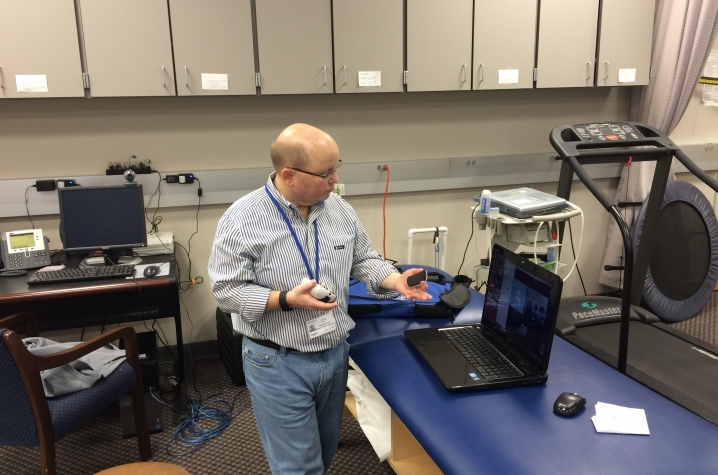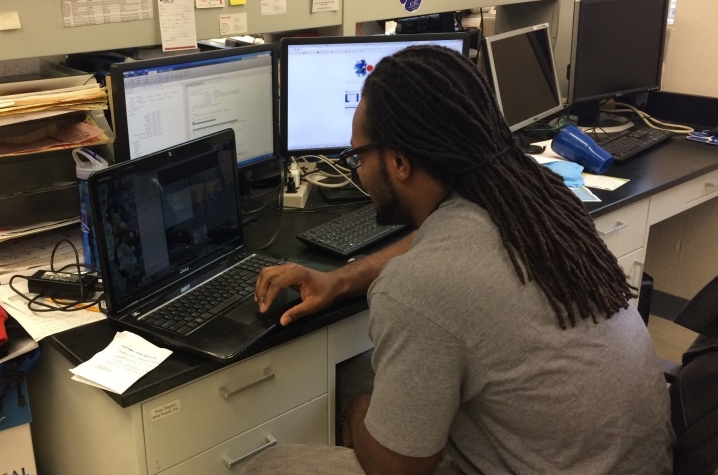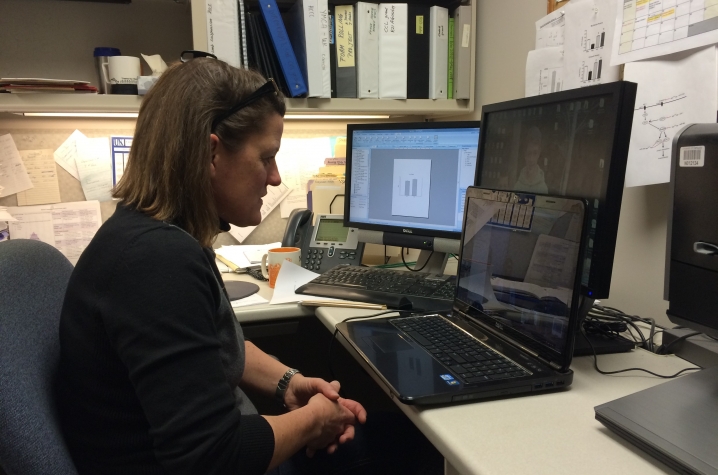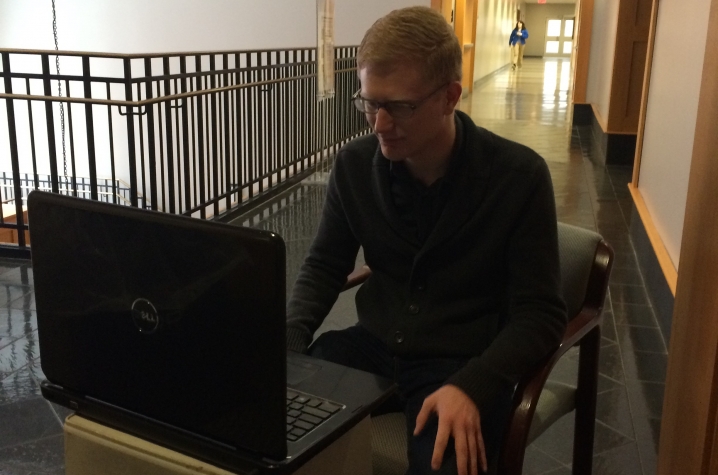UK Project Engages Next Generation of Kentuckians to Tackle Health Problems
LEXINGTON, Ky. (April 13, 2015) — How can Kentucky tackle its chronic health disparities — cancer, heart and pulmonary disease, stroke and other preventable illnesses — and create long-lasting solutions?
Targeting adults who deal with these diseases most often is necessary, but so too is engaging teenagers, the next generation of Kentuckians, in the conversation.
One outreach program at the University of Kentucky is doing just that by delivering new STEM (science, technology, engineering and mathematics) education experiences to Kentucky middle and high schools, illuminating the science behind diseases. The "Muscle Health Project" integrates new teaching methods, technology in the classroom, and access to researchers and students at UK in hopes of educating students early on to prevent problems later.
UK College of Education faculty teamed up with researchers from the UK Center for Muscle Biology to launch the project centered around muscle health, which has been implemented in Fayette County Public Schools and Lewis County Public Schools, with additional districts currently signing up.
UK faculty, researchers and students designed the learning modules, and middle and high school science teachers are now applying the modules in their classrooms.
"How can we teach fundamental scientific principles around phenomena kids are interested in, and also something they need to be interested in beyond the classroom? Well let's understand health issues at a fundamental level and look at them from a range of disciplines," said Diane Johnson, assistant director at the Partnership Institute for Math and Science Education Reform (PIMSER) in the UK College of Education.
"Through this project and others, we're making students aware of a range of health issues at an early age, saying 'look at what happens in your body,' then tasking them with crafting a message and teaching others about those issues," Johnson said.
Students are introduced to the Muscle Health Project with the scenario of a classmate being diagnosed with muscular dystrophy (MD), and are then tasked with helping the classmate understand the disease. Teams of students also work on various hands-on assignments, such as building models of skeletal and cardiac muscle; examining sarcomeres of real muscle obtained from a deli under a compound microscope; recording surface EMGs on themselves; and conducting web-based searches on the disease.
Their assignments culminate with each team presenting their research and findings in a science symposium. But the experience isn't over quite yet.
Using Skype, UK researchers and students follow-up with the middle and high school students by answering additional questions about MD and muscles in general. Recently, in one week alone, 10 different classes in Fayette County skyped with individuals at UK.
"Interacting with middle school students was a great change in pace for me as a college professor who primarily deals with graduate students and professional students," said Timothy Uhl, director of the Musculoskeletal Research Laboratory and professor of athletic training at UK, who skyped with Fayette County middle school students. "They are open minded and appeared to be very engaged with understanding muscular dystrophy…they were very shocked about the permanent nature of muscular dystrophy disability."
The success of the Muscle Health Project is a testament to the efforts of several UK researchers, students, departments and colleges. Robin Cooper in the Department of Biology and Center for Muscle Biology, who leads the project; Rebecca M. Krall in the College of Education; Kim Zeidler-Watters, director of PIMSER; E.E. Dupont-Versteegden in the College of Health Sciences; Bruce Maley at the UK Imaging Facility and others joined forces to develop the project.
Undergraduates in biology, mathematics, agriculture, biotechnology, engineering, physical therapy and a soon-to-be UK College of Medicine student also helped design activities and answer questions through Skype.
Cooper says the idea for the Muscle Health Project came from his experience in the UK nursing program several years ago - he received his Bachelor of Science in nursing in his free time - and his involvement with PIMSER in the College of Education.
Since Kentucky adopted the Next Generation Science Standards (NGSS), middle and high school science classes are being transformed by integrating science with technology, engineering and mathematics (STEM), and PIMSER is training many science teachers across the Commonwealth to implement NGSS.
"It was perfect timing. There was a need for integrative projects and activities for life science teachers to engage students with," Cooper said. "And after attending the nursing program and learning that many of the health problems are preventable, I saw a real need in Kentucky."
The project is the first of several that are focused on Kentucky health issues and designed and executed by various faculty members in the College of Education, College of Engineering, Center for Muscle Biology, College of Health Sciences, College of Medicine, and College of Arts and Sciences.
But why is it important that middle and high school students study muscle health? Not only are there various diseases and problems the students can research related to muscle health, but Cooper says students can also learn basic life science concepts related to the topic, such as cellular process, energy needs, nutrition, obesity and more.
"Many of the students are very interested in their own body and how it works," Cooper said. "They can build physical models, measure muscle bioelectricity, view different types of muscle (fish, beef, pork) in a compound microscope. One student even said the other day, 'I don't see any difference in fish and chicken muscle banding patterns.' This is exactly what we're aiming for....students exploring and finding out things for themselves."
The Muscle Health Project is already expanding throughout Kentucky schools. In March, Garrard County High school in Lancaster, Kentucky, took on the project in a number of science classes. The project was also presented to the Kentucky Science Teachers Association and may soon be presented to the National Science Teachers Association.
Following the project's success, Cooper and others are designing programs focused on the cardiovascular system, population dynamics (nutrition and general health), and imaging from small to large objects (electron microscopic level to whole body).
"As many projects rarely cover all parts of STEM, we make a concerted effort to do so, along with covering literacy as the students have to read science-based papers and write reports," Cooper said. "All of these projects actually bridge science, technology, engineering and math together, and allow Kentucky's students to truly understand these health problems."
MEDIA CONTACT: Whitney Harder, 859-323-2396, whitney.harder@uky.edu








